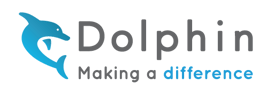Dolphin champions diversity and inclusion in the workplace. We work towards a diverse team in all respects, and this includes neurodiversity. Dolphin recognises the benefits of being neuroinclusive, and the advantages employing neurodivergent team members has to our business.
We invited Melanie Francis, an accomplished senior HR professional and neurodiversity champion to the Dolphin Blog, to provide information and advice on how to become a neuroinclusive employer.
Mel Francis is the Strategic People Partner at London Business School. With significant experience gained over the last 25 years in the public, private and not-for-profit sectors, she has worked with organisations during start up, growth, restructures and downturn.
Mel is also the parent of a neurodivergent teen and works to improve accessibility and awareness for all neurodivergent talent in the workplace.
We're delighted to welcome Melanie to the Dolphin Blog and to learn how organisations can take steps to build neurodiverse teams and make business more accessible for neurodivergent colleagues.
What is neurodiversity?
How boring would the world be if we were all the same? The fact is that we are all diverse. Some of us may share certain characteristics, such as same hair colour, height etc., but our brains are definitely individual and unique, just like our fingerprints. The term neurodiversity means that our brains (neuro) differ (diverse) and it was coined by Australian sociologist, Judy Singer, in the 1990’s.
Neurodiversity is becoming better understood and appreciated as our knowledge expands and employers are starting to better recognise the immense talent within the vast neurodiverse community. It is currently estimated that 1 in 5 of us is neurodiverse. That’s a lot of talented individuals!
What is covered under neurodiversity?
There are several key traits that are usually considered when talking about neurodiversity. These correspond to medical disorders, all of which are fairly common but some of which are not very well known. They are:
Dyslexia
Dyslexia can cause problems with reading, writing and spelling.
Dyscalculia
Dyscalculia affects the ability to acquire arithmetical skills. Dyscalculic learners may have difficulty understanding simple number concepts, lack an intuitive grasp of numbers, and have problems learning number facts and procedures.
Developmental Coordination Disorder (Dyspraxia)
Dyspraxia affects fine and/or gross motor coordination in children and adults. It may also affect speech.
Developmental Language Disorder (DLD)
DLD is a type of speech, language and communication need whereby the individual may have difficulty talking and understanding language.
Autistic Spectrum Disorder (ASD)
With ASD, the way you think about and experience the world is different to most people. Autism is considered a spectrum because it’s different for every autistic person.
Attention Deficit Hyperactivity Disorder (ADHD)
ADHD is a condition that affects people’s behavior. People with ADHD can seem restless, may have trouble concentrating and may act on impulse.
Tic disorders, including Tourette syndrome
A condition that causes a person to make involuntary sounds and movements called tics.
Neurodiverse talent
A research report published by The Institute of Leadership & Management in 2020 revealed that half of leaders and managers would not employ a neurodiverse person. It also found that most organisations do not include neurodiversity in their diversity and inclusion strategy and nor do they offer training on inclusion to staff.
A lack of knowledge and appreciation of neurodiverse talent might mean that the potential to attract, recruit, develop and retain neurodivergent staff could be overlooked. We may continue to miss the opportunity to drive inclusion of neurodiverse talent unless we make a conscious effort to increase our awareness.
Many employers are now realising the potential of neurodiverse talent and are actively seeking to attract and appreciate neurodivergent staff. Some employers who are doing this well include BBC, Microsoft, JPMorgan Chase and EY, who have recently launched a ‘Neuro-Diverse Centre of Excellence’ in the UK.
These organisations already recognise that creating a supportive working environment for individuals with cognitive differences will help them to apply their strengths and help the organisation to excel.
The benefits of a neurodiverse team
We now know much more about the benefits of diversity within teams, and this includes neurodiversity.
Having a neurodiverse team will bring more ideas, creativity, innovation and different ways of communicating. If you have a team of ten people who all think alike, you are going to get ten ideas all the same. If you have a team of ten people who think differently, you are going to get ten times as many ideas!
Neurodiverse strengths are likely to outweigh any challenges in teams and the benefits to organisations is clear as we move into our post-pandemic ways of working.
How can you become a neuroinclusive employer?
Being neuroinclusive is important for organisations of all sizes. Not only do we have ethical, moral and legal responsibilities, but it is great for business!
As we start to emerge from the pandemic, our approach to working practices are changing and the impact the past 18 months has had on those who are neurodivergent can be particularly challenging.
If you want to move towards being a neuroinclusive employer, here are some positive steps to take:
- Get buy-in from the top of the organisation, so there is a commitment to make a genuine difference and it is not seen as a one-off activity.
- Communicate your ambition to be a neuroinclusive employer and invite colleagues who are equally committed to join you in making the positive difference. This could lead to the creation of a staff network which can help with collaboration and communication.
- Increase your own awareness of neurodiversity and then do the same for your organisation, and especially your line managers. Having knowledge and appreciation of neurodiversity will help to build confidence across your organisations.
- Demonstrate that you care and are interested in recognising, understanding and attracting a neurodiverse range of skills and talents.
- Start to look at your policies, processes and practices with a neurodiversity lens. Is your website neuroinclusive? Do your job adverts use too many words? Are your recruitment practices truly inclusive for neurodivergent candidates? Is your performance management process helping neurodiverse talent to thrive?
- Look inside your organisation and check on your existing talent. Do they feel able to bring their whole selves to work? Are you creating an environment to enable them to thrive and be open with others about their neurodivergence?
Focusing on people’s strengths will ensure that you have an organisation where everyone is able to be their best - and by being neuroinclusive - you can ensure you don’t miss out on the immense talent of the estimated 20% of our population.
Dolphin EasyReader
EasyReader is an accessible reading app. Designed to make reading a pleasure for people who have neurodiverse condition such as dyslexia, as well as for people with visual impairments.
With EasyReader, users can customise their reading experience. For example, readers can choose their preferred colour scheme for text and background, change the text display to a dyslexia-friendly font and use speech settings to listen to documents and books.
EasyReader has clipboard functionality, which can be helpful in a business environment. Use the clipboard to read text from a document, website or email on your customised screen or choose read-along features and audio settings. This can be really helpful when neurodivergent colleagues are required to read reports and documents.
EasyReader provides direct access to the world’s largest collection of accessible book and newspaper services, this includes RNIB Bookshare Education Collection, which provides accessible versions of school and university textbooks for students with a print-disability and Calibre Audio, which is free to anyone with a print disability.
Download the EasyReader App free on iOS and Android tablets and smartphones and Kindle Fire devices.
Or purchase EasyReader for Windows on the Microsoft Store for use on Windows desktop PCs or laptops.
Watch EasyReader App for Dyslexia Video
More Dolphin Blog articles that might interest you
Assistive Technology for a Productive Workforce >
6 Tips to Make Text-Based Documents Accessible >
5 Ways to Help Assistive Technology Users at Work >
BATA Conference - 13 & 14 October 2021
Disability Confident in Action - Unlocking potential and building inclusion.
This conference - for people from all employment sectors - will include a series of short and lively presentations to help you attract, develop and retain a diverse pool of talented people.
The conference will cover a range of workplace adjustments and finish with a take-away framework document to help promote inclusion in your organisation.
Find out more and register your place >











Let Us Know What You Thought about this Post.
Write your comment below.